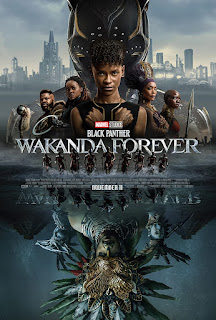Back in 2018, I wrote about how and why Disney completely botched their box office projections for the first Black Panther movie. In 2021, I wrote aout how Disney completely botched their box office projections for Shang-Chi. Well, technically, I didn't write that second one -- it's literally copy/pasted from the first one because Disney completely botched it in precisely the same way, validating the skepticism I expressed in 2018 that they learned their lesson. Now with Black Panther: Wakanda Forever being released this past weekend, do I have to copy/paste that post yet again?
Surprisingly, no. But does that mean Disney actually started incorporating non-racist models into their calculations?
The first projections that were made for Wakanda Forever came out back in October and put the opening weekend box office in North America at "at least $175 million." I'll start by pointing out that the initial projections for the first Black Panther were in the $90 million ballpark, and their first set of revisions after the weekend got underway only bumped it up to around $110 million. The actual first weekend total in 2018 turned out to be $242 million. As of this writing (early Sunday evening), it's being reported that Wakanda Forever has made $180 million domestically for its opening weekend. So the "at least $175 million" seems reasonably accurate.
But I don't think that means Disney has learned from past mistakes and fundamentally changed how they project box office receipts in a way that doesn't have racism baked in.
One of the problems with trying to figure out box office numbers in advance comes from identifying the elemets that will attract audiences. "How many people will pay to see this movie" is a question that usually involves a lot of variables. "How many people will pay to see a movie with Celebrity X in a starring role?" "How many people will pay to see this film in this genre?" "How many people will pay to see a movie directed by Person Y?" And so on. This makes sense to some degeree. Audiences, in general, don't like going into a movie if they know nothing about it, so they'll weigh factors like who worked on it as part of their mental math. Back in 2008, people said, "Well, I have no idea who this Iron Man character is but I like Robert Downey, Jr. and the movie looks like it's got some big explosions in it, so let's check it out." This is why we get so many sequel movies these days -- it's easier to make these box office projections with known quantities. "We made this amount of money on Movie 1, so we should be able to make some percentage of that if we use all the same elements again."
And that is why I think Disney has not actually changed their modeling equations. If you look at the box office totals of movie sequels over the past 15-ish years, they've earned on average just about 75% of their predecessors. And what is $180 million divided by $242 million: 0.7438. Wakanda Forever earned almost exactly the average amount you would could expect a sequel of any movie to earn.
I expect there are statisticans at Disney that factor in other variables and, considering that the cast and crew is virtually idential between the two movies, the loss of Chadwick Boseman is probably the only reason they went with $175 instead of $180 in their projections. But their calculation for a sequel is much more simplistic -- tickets sales from the original times 75%. They probably have the interns make sequel projections like that.
I'm still skeptical about whether or not Disney has learned their lessons from Black Panther and Shang-Chi, and I don't think we'll see that issue come up in the MCU again in the foreseeable future. The next Captain America movie will feature a Black lead, but it's also a sequel. And while 2024's Blade won't be a sequel, it does have a heavy memberberries factor from the Wesley Snipes movies of two decades ago, so it likely gets a "nostaglic remake" calculation. The only other characters I see that might warrant a new style of box office calculations -- e.g. Echo and Ironheart -- are both showing up as TV series and would have a completely different set of metrics to begin with.
If I paid more attention to Hollywood movies in general, I'm sure I could track their projections/actuals ratio better and see if they do seem to be refining their calculations, but you can't tell that based on just the MCU movies at all.
Is Disney Still Relying On Racist Box Office Modeling?
By Sean Kleefeld | Monday, November 14, 2022
Leave a Comment







0 comments:
Post a Comment